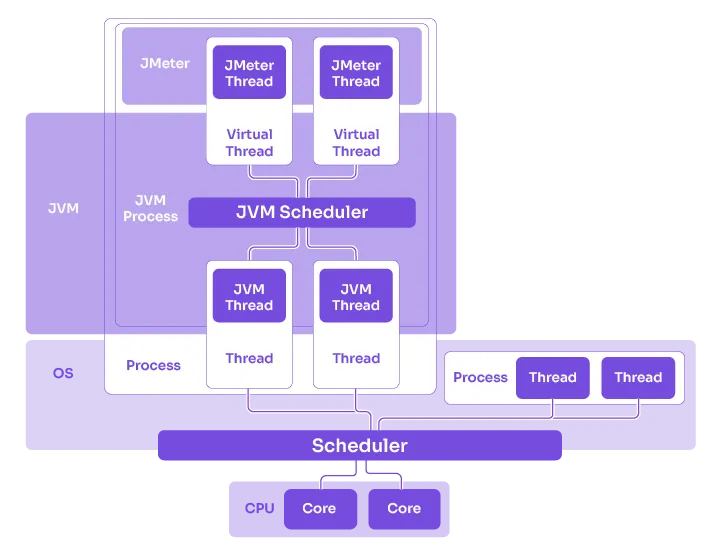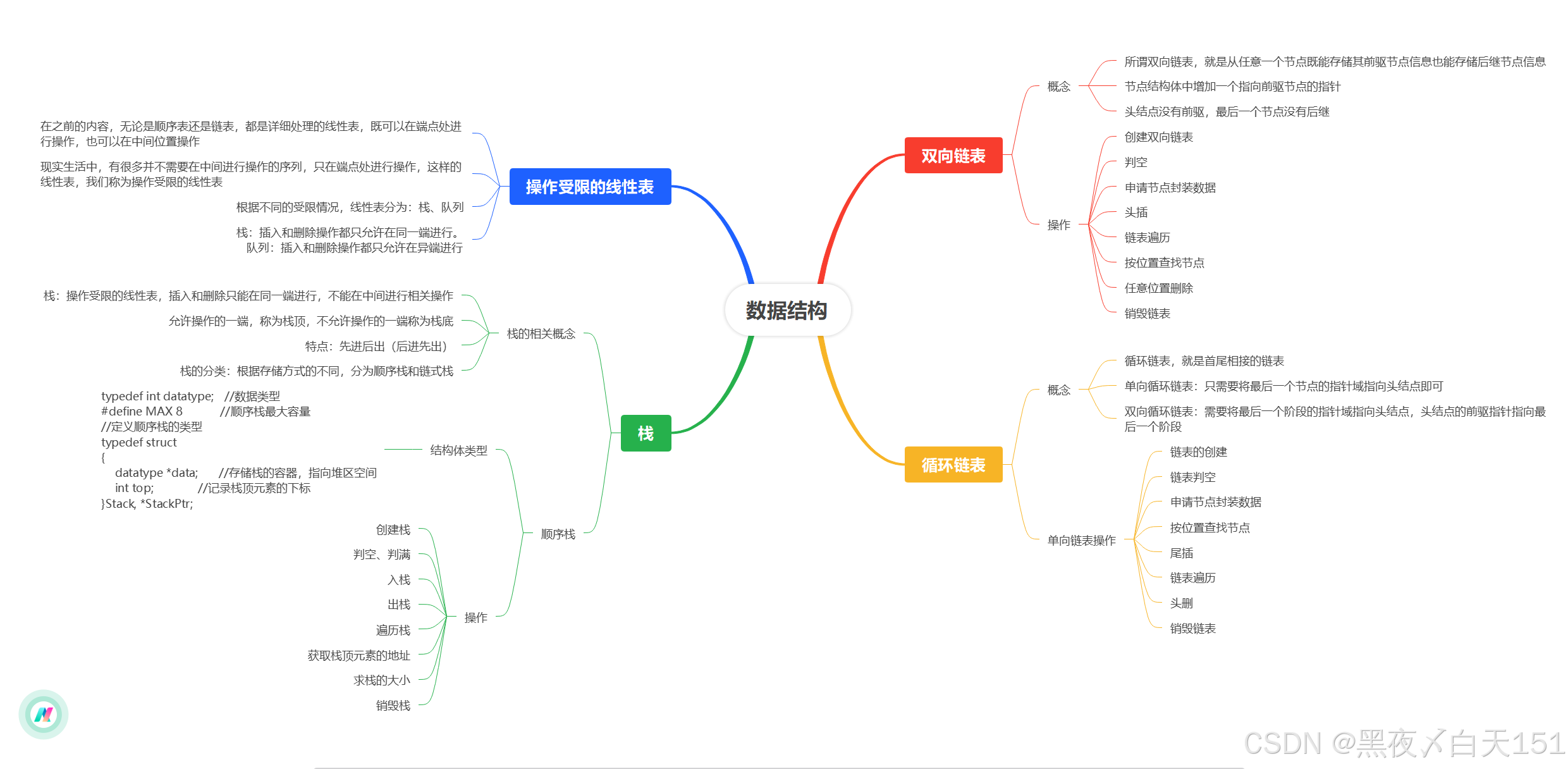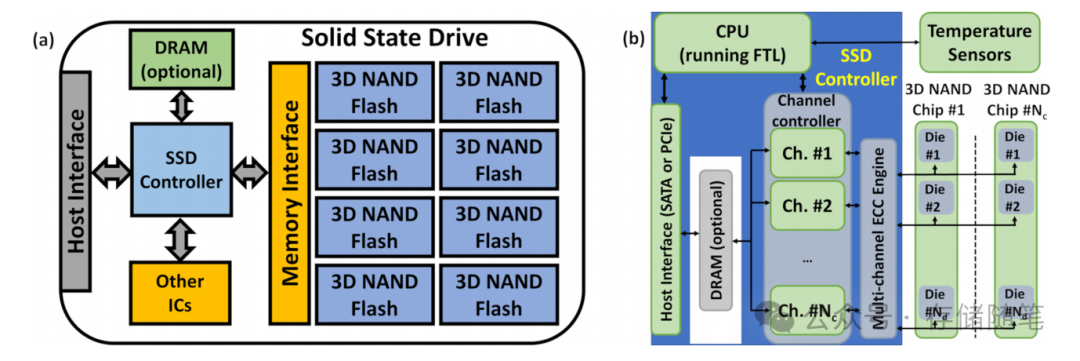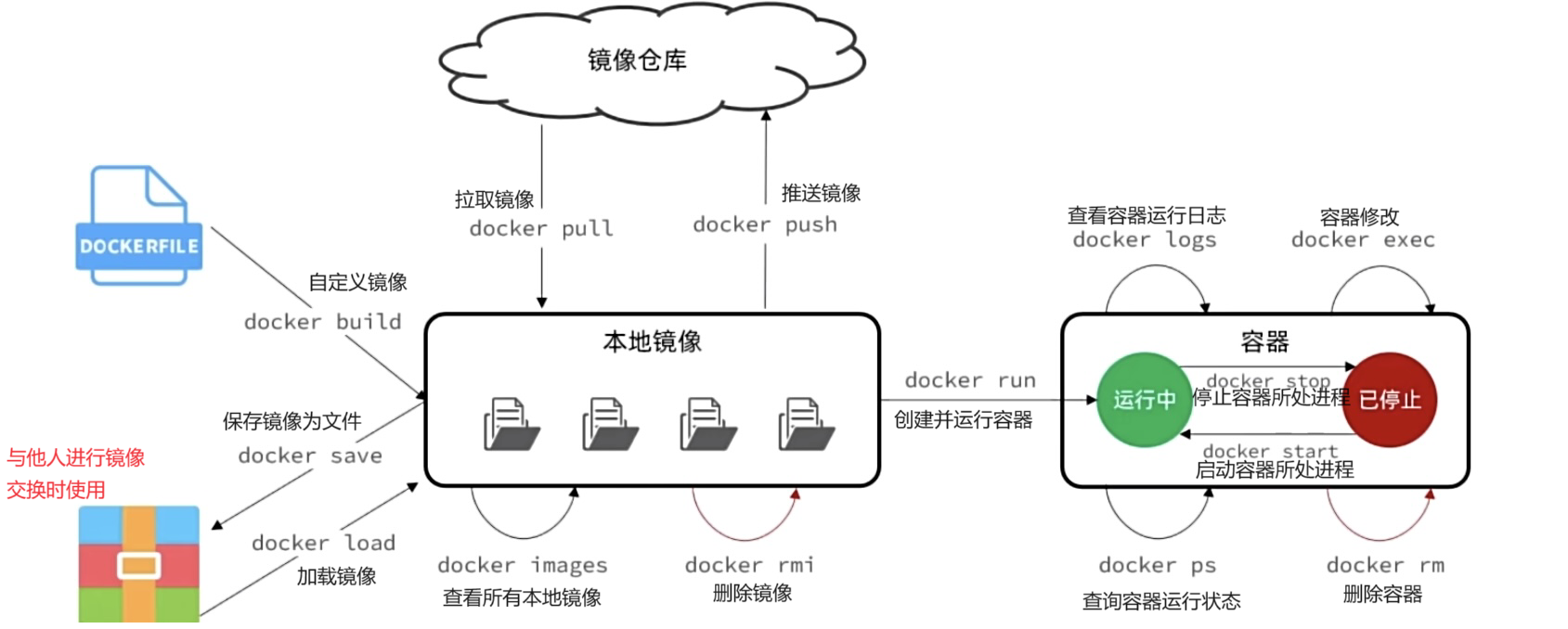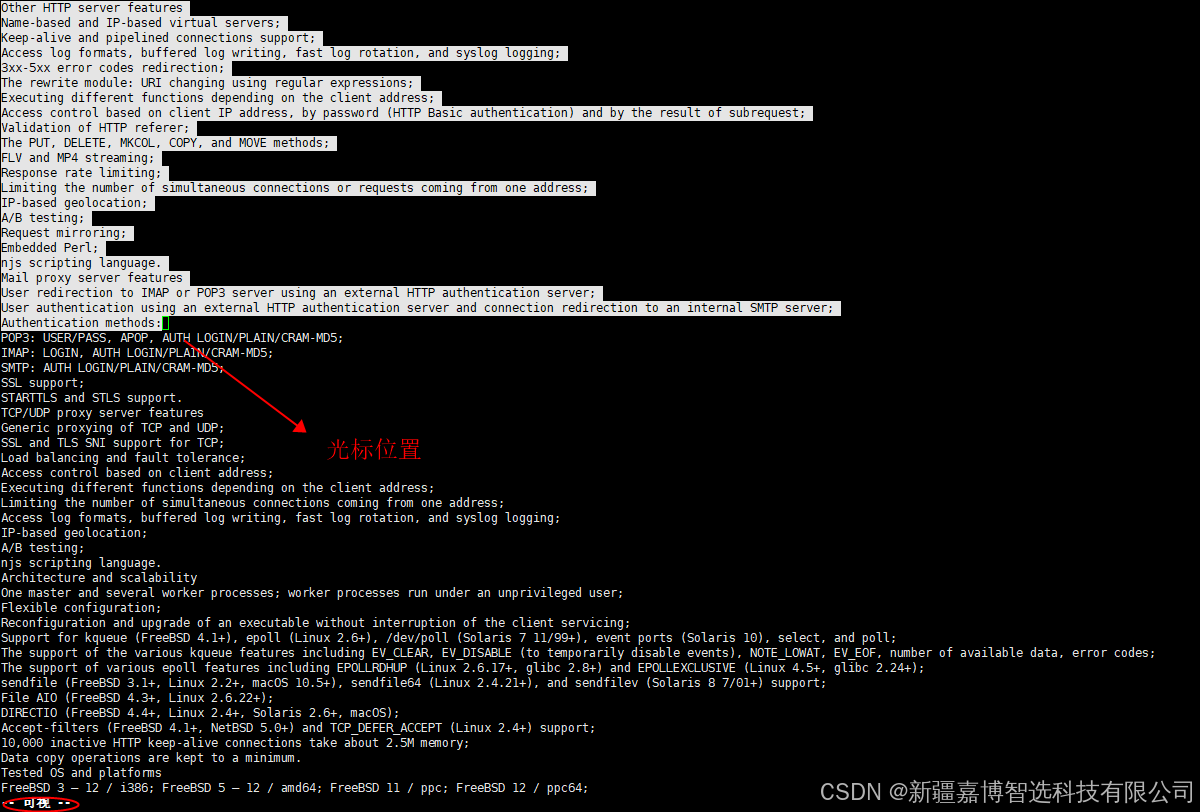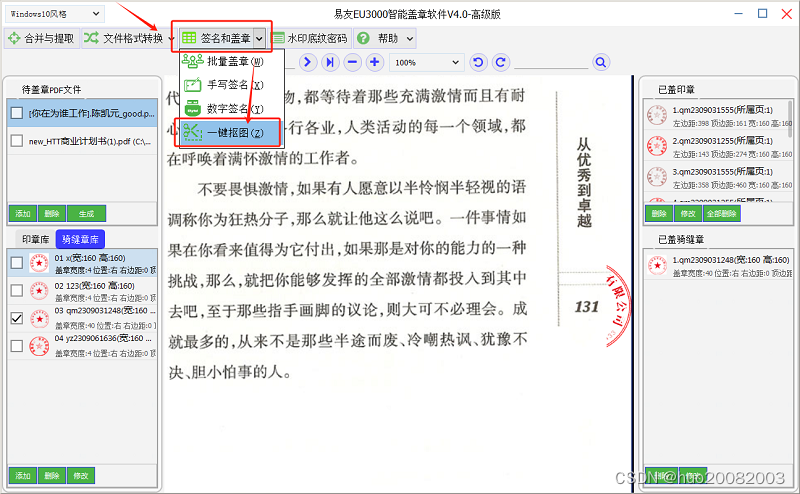目录
boost的线程基本用法
boost::thread Thread_GenerateUuid;
boost::thread Thread_ShowUuid;
boost::mutex mutex;
std::queue<std::string>UuidQueue;
void procGenerateUuid();
void showUuid();
void GetPveDataDemo::procGenerateUuid()
{
try{
for (;;)
{
boost::this_thread::sleep_for(boost::chrono::seconds(2));
boost::this_thread::interruption_point(); // 手动在线程中加入中断点,中断点不影响其他语句执行 当其他地方触发该断点(thread.interrupt())再次执行到此处,抛出boost::thread_interrupted异常,若未捕捉则线程终止。
if (UuidQueue.size() <= 5)
{
boost::lock_guard<boost::mutex> lck_guard(mutex);
std::string uuid = QUuid::createUuid().toString().toStdString();
UuidQueue.push(uuid);
}
}
}
catch (...)
{
}
}
void GetPveDataDemo::showUuid()
{
try{
int cnt = 1;
for (;;)
{
boost::this_thread::sleep_for(boost::chrono::seconds(2));
boost::this_thread::interruption_point();// 手动在线程中加入中断点,中断点不影响其他语句执行 当其他地方触发该断点可从该循环中退出
if (!UuidQueue.empty())
{
boost::lock_guard<boost::mutex> lck_guard(mutex);
std::string cuuid = UuidQueue.front();
UuidQueue.pop();
QString UuidDisplay = "#:" + QString::number(cnt) + ": " + QString(cuuid.c_str()) + "\n";
ui.textBrowser_UUID->append(UuidDisplay);//界面和线程写在一起了不太好
++cnt;
}
}
}
catch (...)
{
}
}
void GetPveDataDemo::on_pushButton_2_clicked()
{
//Uuid线程
if (!Thread_GenerateUuid.joinable() && !Thread_ShowUuid.joinable()) //joinable判断线程是否结束
{
Thread_GenerateUuid = boost::thread(boost::bind(&GetPveDataDemo::procGenerateUuid, this));
Thread_ShowUuid = boost::move(boost::thread(boost::bind(&GetPveDataDemo::showUuid, this)));
ui.pushButton_2->setText(QString::fromLocal8Bit("停止生成UUID"));
}
else
{
Thread_GenerateUuid.interrupt(); //向线程发送中断请求
Thread_ShowUuid.interrupt();
Thread_GenerateUuid.join();//join连接 detach是脱离线程 不会阻塞
Thread_ShowUuid.join(); //join函数,作用是等待直到线程执行结束; 阻塞当前线程
ui.pushButton_2->setText(QString::fromLocal8Bit("开始生成UUID"));
ui.textBrowser_UUID->clear();
ui.textBrowser_UUID->append(QString::fromLocal8Bit("当前生产线程停止"));
ui.textBrowser_UUID->append(QString::fromLocal8Bit("当前消费线程停止"));
}
//move 移动语义 将临时对象的所有权给予GenerateUuid,避免临时变量不必要的拷贝和析构
}

boost:condition
与std的条件变量一样会有虚假唤醒问题,同样需要谓词处理。
#define LANENUM 32
boost::mutex mtx_etcSignal[LANENUM];
boost::condition m_cond_etcSignal[LANENUM];
map<string,int> plateNo2flag;
bool waitForEtcSignal(int laneNo,const string&plate,int connTime)
{
boost::mutex::scoped_lock lk(mutex mtx_etcSignal[laneNo]);
m_cond_etcSignal[laneNo].wait_for(lk,bost::chrono::milliseconds(connTime),[&]()
{
if(plateNo2flag.count(plate)&&plateNo2flag[plate] == 1)
{
plateNo2flag.erase(plate);
return true;
}
else
{
return false;
}
});//添加谓词避免虚假唤醒
return false;
}
//扣费线程发起扣费请求...
bool status = waitForEtcSignal(laneNo,plate,connTime);
if(status)
{
//...
}
//server线程收到扣费结果
//...
if(paySuccess)
{
boost::mutex::scoped_lock lk(mutex mtx_etcSignal[laneNo]);
plateNo2flag[plate] = 1;
m_cond_etcSignal[laneNo].notify_all();
}
thread_group 线程组
boost::thread_group 实际利用list<thread>管理一组线程,方便批量管理;如批量join;不是线程池,没有线程池的自动伸缩等功能。

bool TestServerClient::startServer()
{
if (!m_bStarted)
{
if (!group)
{
group = new boost::thread_group();
}
try{
group->create_thread(boost::bind(&TestServerClient::func_1, this));
group->add_thread(new boost::thread(boost::bind(&TestServerClient::func_2, this, "hello client")));
//创建线程会自动加入list中(无法接受参数,需要bind) add添加线程
m_bStarted = true;
}
catch (std::runtime_error e)
{
std::string errorstr(e.what());
}
}
return m_bStarted;
}
void TestServerClient::stopServer()
{
if (m_bStarted)
{
group->interrupt_all();
group->join_all();
group = nullptr;
}
}thread_pool
boost的线程池概述:
https://threadpool.sourceforge.net/index.html
threadpool是基于[boost]库实现的一个线程池子库 .
/*! \file
* \brief Thread pool core.
*
* This file contains the threadpool's core class: pool<Task, SchedulingPolicy>.
*
* Thread pools are a mechanism for asynchronous and parallel processing
* within the same process. The pool class provides a convenient way
* for dispatching asynchronous tasks as functions objects. The scheduling
* of these tasks can be easily controlled by using customized schedulers.
*
* Copyright (c) 2005-2007 Philipp Henkel
*
* Use, modification, and distribution are subject to the
* Boost Software License, Version 1.0. (See accompanying file
* LICENSE_1_0.txt or copy at http://www.boost.org/LICENSE_1_0.txt)
*
* http://threadpool.sourceforge.net
*
*/
#ifndef THREADPOOL_POOL_HPP_INCLUDED
#define THREADPOOL_POOL_HPP_INCLUDED
#include <boost/ref.hpp>
#include "./detail/pool_core.hpp"
#include "task_adaptors.hpp"
#include "./detail/locking_ptr.hpp"
#include "scheduling_policies.hpp"
#include "size_policies.hpp"
#include "shutdown_policies.hpp"
/// The namespace threadpool contains a thread pool and related utility classes.
namespace boost { namespace threadpool
{
/*! \brief Thread pool.
*
* Thread pools are a mechanism for asynchronous and parallel processing
* within the same process. The pool class provides a convenient way
* for dispatching asynchronous tasks as functions objects. The scheduling
* of these tasks can be easily controlled by using customized schedulers.
* A task must not throw an exception.
*
* A pool is DefaultConstructible, CopyConstructible and Assignable.
* It has reference semantics; all copies of the same pool are equivalent and interchangeable.
* All operations on a pool except assignment are strongly thread safe or sequentially consistent;
* that is, the behavior of concurrent calls is as if the calls have been issued sequentially in an unspecified order.
*
* \param Task A function object which implements the operator 'void operator() (void) const'. The operator () is called by the pool to execute the task. Exceptions are ignored.
* \param SchedulingPolicy A task container which determines how tasks are scheduled. It is guaranteed that this container is accessed only by one thread at a time. The scheduler shall not throw exceptions.
*
* \remarks The pool class is thread-safe.
*
* \see Tasks: task_func, prio_task_func
* \see Scheduling policies: fifo_scheduler, lifo_scheduler, prio_scheduler
*/
template <
typename Task = task_func,
template <typename> class SchedulingPolicy = fifo_scheduler,
template <typename> class SizePolicy = static_size,
template <typename> class SizePolicyController = resize_controller,
template <typename> class ShutdownPolicy = wait_for_all_tasks
>
class thread_pool
{
typedef detail::pool_core<Task,
SchedulingPolicy,
SizePolicy,
SizePolicyController,
ShutdownPolicy> pool_core_type;
shared_ptr<pool_core_type> m_core; // pimpl idiom
shared_ptr<void> m_shutdown_controller; // If the last pool holding a pointer to the core is deleted the controller shuts the pool down.
public: // Type definitions
typedef Task task_type; //!< Indicates the task's type.
typedef SchedulingPolicy<task_type> scheduler_type; //!< Indicates the scheduler's type.
/* typedef thread_pool<Task,
SchedulingPolicy,
SizePolicy,
ShutdownPolicy > pool_type; //!< Indicates the thread pool's type.
*/
typedef SizePolicy<pool_core_type> size_policy_type;
typedef SizePolicyController<pool_core_type> size_controller_type;
public:
/*! Constructor.
* \param initial_threads The pool is immediately resized to set the specified number of threads. The pool's actual number threads depends on the SizePolicy.
*/
thread_pool(size_t initial_threads = 0)
: m_core(new pool_core_type)
, m_shutdown_controller(static_cast<void*>(0), bind(&pool_core_type::shutdown, m_core))
{
size_policy_type::init(*m_core, initial_threads);
}
/*! Gets the size controller which manages the number of threads in the pool.
* \return The size controller.
* \see SizePolicy
*/
size_controller_type size_controller()
{
return m_core->size_controller();
}
/*! Gets the number of threads in the pool.
* \return The number of threads.
*/
size_t size() const
{
return m_core->size();
}
/*! Schedules a task for asynchronous execution. The task will be executed once only.
* \param task The task function object. It should not throw execeptions.
* \return true, if the task could be scheduled and false otherwise.
*/
bool schedule(task_type const & task)
{
return m_core->schedule(task);
}
/*! Returns the number of tasks which are currently executed.
* \return The number of active tasks.
*/
size_t active() const
{
return m_core->active();
}
/*! Returns the number of tasks which are ready for execution.
* \return The number of pending tasks.
*/
size_t pending() const
{
return m_core->pending();
}
/*! Removes all pending tasks from the pool's scheduler.
*/
void clear()
{
m_core->clear();
}
/*! Indicates that there are no tasks pending.
* \return true if there are no tasks ready for execution.
* \remarks This function is more efficient that the check 'pending() == 0'.
*/
bool empty() const
{
return m_core->empty();
}
/*! The current thread of execution is blocked until the sum of all active
* and pending tasks is equal or less than a given threshold.
* \param task_threshold The maximum number of tasks in pool and scheduler.
*/
void wait(size_t task_threshold = 0) const
{
m_core->wait(task_threshold);
}
/*! The current thread of execution is blocked until the timestamp is met
* or the sum of all active and pending tasks is equal or less
* than a given threshold.
* \param timestamp The time when function returns at the latest.
* \param task_threshold The maximum number of tasks in pool and scheduler.
* \return true if the task sum is equal or less than the threshold, false otherwise.
*/
bool wait(xtime const & timestamp, size_t task_threshold = 0) const
{
return m_core->wait(timestamp, task_threshold);
}
};
/*! \brief Fifo pool.
*
* The pool's tasks are fifo scheduled task_func functors.
*
*/
typedef thread_pool<task_func, fifo_scheduler, static_size, resize_controller, wait_for_all_tasks> fifo_pool;
/*! \brief Lifo pool.
*
* The pool's tasks are lifo scheduled task_func functors.
*
*/
typedef thread_pool<task_func, lifo_scheduler, static_size, resize_controller, wait_for_all_tasks> lifo_pool;
/*! \brief Pool for prioritized task.
*
* The pool's tasks are prioritized prio_task_func functors.
*
*/
typedef thread_pool<prio_task_func, prio_scheduler, static_size, resize_controller, wait_for_all_tasks> prio_pool;
/*! \brief A standard pool.
*
* The pool's tasks are fifo scheduled task_func functors.
*
*/
typedef fifo_pool pool;
} } // namespace boost::threadpool
#endif // THREADPOOL_POOL_HPP_INCLUDED
使用示例:
// fifo策略的pool
boost::threadpool::pool _thread_pool;
_thread_pool.size_controller().resize(4);
_thread_pool.schedule(boost::bind(&LedDevice::SendParkingLots, this, nBelongedPark));
//同步等待结束
_thread_pool.wait();
// priority优先级线程池
#include <boost/thread.hpp>
#include "threadpool/pool.hpp"
class HaiNanEtcInterface final:public EtcInterface
{
public:
//...
enum Priority_Level
{
LowPriority = 100,
MidPriority = 200,
HighPriority = 300
};//枚举声明 不定义不占内存 实际存在常量区(static 也在常量区)均可类名:访问
private:
atomic_bool m_bStarted;
boost::threadpool::prio_pool m_EtcThreadPool;
};
bool HaiNanEtcInterface::startServer()
{
if (!m_bStarted)
{
m_EtcThreadPool.size_controller().resize(4);//初始化线程池大小
}
m_bStarted = true;
return m_bStarted;
}
//使用优先级策略的线程池
void HaiNanEtcInterface::queryFee(const PassVehicle& pve)
{
if (m_EtcThreadPool.size() > 1)
{ m_EtcThreadPool.schedule(boost::threadpool::prio_task_func(HighPriority, boost::bind(&HaiNanEtcInterface::queryFeeFunc, this,pve)));
}
}
void HaiNanEtcInterface::checkTime()
{
if (m_EtcThreadPool.size() > 1)
{ m_EtcThreadPool.schedule(boost::threadpool::prio_task_func(LowPriority, boost::bind(&HaiNanEtcInterface::checkTimeFunc, this)));
}
}
void HaiNanEtcInterface::stopServer()
{
if (m_bStarted)
{
//清除pending的task 在等待所有active和pending的task结束
m_EtcThreadPool.clear();
m_EtcThreadPool.wait();
}
}

